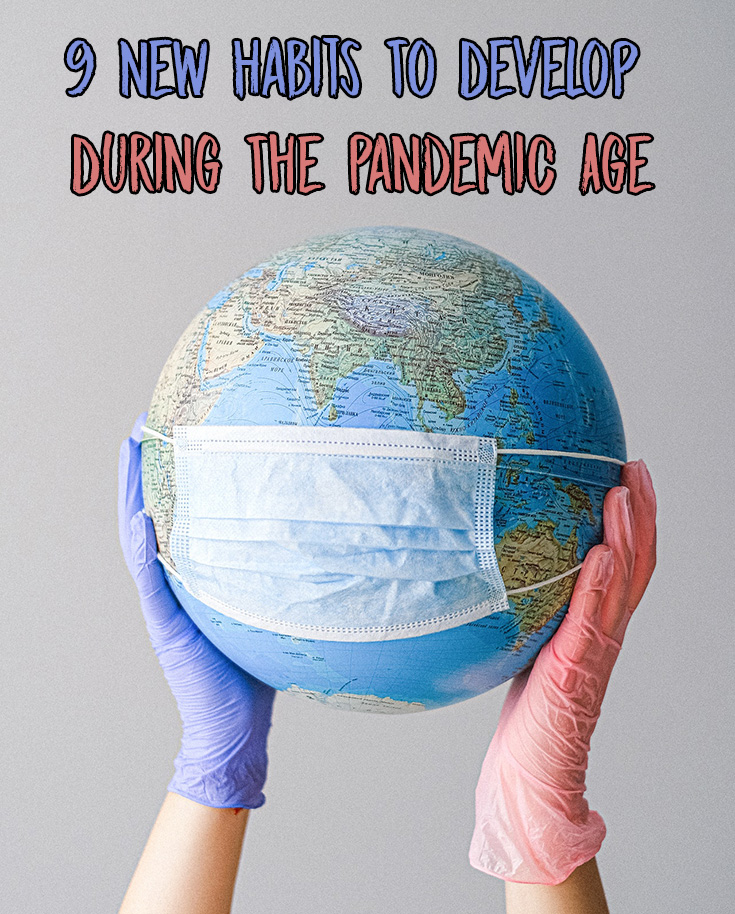The COVID-19 pandemic has brought about significant changes in people’s day-to-day living. Numerous health policies have been put in place as precautionary and preventive measures to protect people from infection.

These policies, many of which involve good hygiene practices and restrictions on erstwhile normal activities, have forced many to develop new habits and to start new daily routines. Here are just some of these new and necessary habits to develop to keep oneself safe during the pandemic.
- Wear a Face Mask
In the age of a pandemic, the importance of wearing a face mask cannot be overemphasized. Face masks have been scientifically proven to reduce the rate of transmission of disease-causing pathogens, especially when they are used properly. There are many kinds of face masks one can wear in various settings. An antimicrobial face mask made of cloth, for example, can be worn on a daily basis and is often enough to limit the spread of infection in low-risk communities. On the other hand, surgical masks and N95 respirators are more appropriate to be worn by healthcare professionals in intermediate- to high-risk settings.
- Cover Coughs and Sneezes the Right Way
Many infectious diseases can be caught through airborne respiratory aerosols and respiratory droplets. Like wearing a face mask, covering coughs and sneezes properly can slow down the spread of infection by providing a barrier that prevents microbial particles from being transmitted to another person. Here are some helpful tips to remember when coughing or sneezing:
- Cover your mouth and nose with a tissue paper, handkerchief or any clean piece of cloth when you cough or sneeze
- If a tissue paper or handkerchief is not readily available, use you shirt sleeve or the inside of your elbow when coughing or sneezing
- Throw used tissues in the trash
- Wash Hands with Soap
Handwashing with soap and water can help prevent pathogen transmission by killing microbes that can be acquired from direct, indirect or close contact. Handwashing is one of the easiest yet most critical practices one must observe especially during a pandemic. To help curb the spread of microbial infections, it is recommended to practice handwashing at regular intervals, when caring for a sick person, before and after eating, after using the toilet, and while preparing food.
- Observe Physical Distancing
Scientists have found that large respiratory droplets can travel to up to two meters or six feet. This means that keeping a distance of at least two meters from another person can help lessen the amount of droplets that can be transmitted when the person coughs or sneezes. Maintaining physical distancing, along with other precautionary measures such as wearing a face mask and regular handwashing, can help slow down the rate of infection especially in high-risk areas.
- Avoid Crowded Places
Microbial particles spread more rapidly in big groups of people confined within small spaces. This is because there is only little distance for the particles to travel before being inhaled by another person. In addition, some people without symptoms may be disease-carriers and may be able to infect other people. Practicing proper physical distancing, avoiding crowded places, and refraining from attending social events can significantly reduce the probability of acquiring an infection.
- Always Bring a Hand Sanitizer
Germs are everywhere—on door knobs, tables, even on your phones and desktops. While handwashing with soap and water remains to be the most effective way of keeping oneself protected from these pathogens, doing it might not always be possible in all situations. A great alternative would be alcohol-based hand sanitizers containing at least 60% alcohol. These hand sanitizers can kill most germs that can be found on hands and communal surfaces and are useful especially for people on the go.
- Avoid Touching Potentially Contaminated Surfaces
Infection can also spread from touching potentially contaminated surfaces. Studies have shown that microbial pathogens can survive on surfaces for up to 72 hours, which is more than enough time for a person to catch an infection. If touching a communal surface is unavoidable, make sure to wash your hands with soap and water after doing so.
- Choose the Outdoors
Outdoor spaces are generally way safer than indoor spaces primarily because outdoor spaces are well-ventilated. Ventilation plays a big role in controlling microbial transmission. It reduces the load of airborne pathogens and decreases indirect contamination by blowing away particles before they land on surfaces. If an occasion requires you to meet people in an enclosed area, pick a place that has big windows that can be opened to ensure a good flow of air.
- Stay at Home as Much as You Can
Because of the pandemic, many social, religious, and leisure activities have been restricted to avoid big gatherings where microbes can rapidly spread. This also means that people have been forced to stay at home, but for good reasons. Many people can be asymptomatic carriers who can transmit the infection unknowingly, and one way to protect yourself and your family is to limit going outside to do only the most necessary activities, like getting groceries or doing laundry.
These are all important habits to develop and to keep in mind during the pandemic. Practicing them with diligence will not only help keep you safe from infections, but more importantly, it will help put an end to the pandemic.






Speak Your Mind